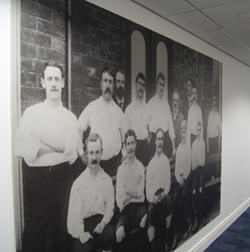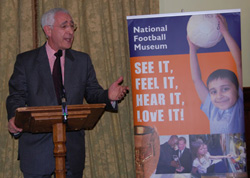William Sudell
The historic role of ‘proactive’
PNEFC-William Sudell - By Dave Bond
How many people know the difference
between the Football Association & the Football (Premier) League?
It may be used to illustrate the north/south divide in England.
Followers of PNE & Proud Prestonians ought rightly to know the
part played by the club & town in the development of the world’s
most popular game.
Though football in various forms had been played throughout the
centuries it was the landed gentry of the posh public i.e. exclusive
colleges & universities e.g. Harrow, Eton, Oxford centred in
London & the South that settled the game with their basic laws
in 1864. Strictly amateur it was indeed a ‘Gentleman’s
game’, they had the time of course, not having to labour in
factories or down the mines. But this new southerners’ game
was spreading rapidly to the North.
In 1867 William Sudell, a brilliant accountant & lover of sport
joined Preston Nelson –a cricket & rugby club. Sudell
was to be the leading figure in the fight to establish professional
football. Moving across the way from Moor Park to Deepdale farm
in 1875 early experiments began with this new game of association
football. By 1880 people paid willingly to watch games & Sudell,
now the leading committee man oversaw banking & fences erected
with a changing room pavilion tent situated in the North West corner
of the ground, very similar to the one at Blackburn Rovers. Indeed
Sudell copied other leading clubs such as Darwen, Blackburn et al
& proved better & more astute in attracting Scots from Edinburgh
& paying them however indiscreetly.
 The southerners of the F.A. were abhorred by what was happening
to their game ‘oop North & banned PNE along with other
clubs from their prestigious FA cup. The resolute Sudell stood firm
& threatened to head a breakaway organisation aligned with the
Scots; a British FA. The FA feared losing control of their game
& in 1885 conceded to the notion of paid professional footballers.
Without Sudell’s influence would association football gone
the way of the Rugby code i.e. league/union?
The southerners of the F.A. were abhorred by what was happening
to their game ‘oop North & banned PNE along with other
clubs from their prestigious FA cup. The resolute Sudell stood firm
& threatened to head a breakaway organisation aligned with the
Scots; a British FA. The FA feared losing control of their game
& in 1885 conceded to the notion of paid professional footballers.
Without Sudell’s influence would association football gone
the way of the Rugby code i.e. league/union?
However, all games were arranged ad hoc & in a desultory fashion. In 1888 at the instigation of William McGregor of Aston Villa 12 clubs, 6 from Lancashire, 6 from the Midlands were invited to form the Football League, note: no north east or southern clubs. Sudell was invited to become the League’s first treasurer. The League of course avowed to abide by the FA’s association laws but stressed to all clubs that the league competition came first & that all clubs must play their strongest team (the only original rule to still apply).
(Above) Lord Triesman, former FA Chairman.
McGregor admitted this new idea
would not succeed without PNE. It was Sudell who gave it the name
League as opposed to Union. Deepdale can thus lay claim to being
the oldest professional football league ground in the world. Along
with Burnley the only founder member clubs at their original ground.
Does this warrant a blue World Heritage plaque? I believe so &
possibly situated at the North West corner – the site of the
original pavilion tent.
Thus began a revolution with PNE the first winners of the first
football league in the world & all the more astounding that
within a few short years Sudell had made PNE the most respected
& feared football team in the land.
There can be no doubt that the southern FA is responsible for beginning
this now world wide phenomena of association football but perhaps
the game we now see at clubs like PNE or even in the FIFA world
cup competitions is more largely due to the ‘proactive’
role of William Sudell & the working class lads from the industrial
towns of the North.
Also consider that when Ronaldo moves to Real Madrid for £80
million or Toure is on a reported £200,000 a week at Manchester
City is it due mainly to the efforts of William Sudell?
Amusing footnote.
Whilst working with the National Football Museum at the House
of Commons I met the then chair of the FA, Lord Triesman. A bemused
guest enquired who it was. I told her his name to which she said
“but who does he represent”? “The Public Schools
“ said I. “And who do you represent”? the lady
asked. “Why, ‘The Public Houses” I replied.